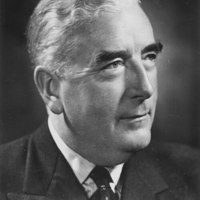Rt. Hon. R.G. Menzies
Item
-
Job Title
Prime Minister of Australia
-
Description
Sir Robert Gordon Menzies (20 December 1894 – 15 May 1978) was an Australian politician and lawyer who served as the 12th prime minister of Australia from 1939 to 1941 and 1949 to 1966. He held office as the leader of the United Australia Party (UAP) in his first term, and subsequently as the inaugural leader of the Liberal Party of Australia, which he was responsible for establishing and defining in policy and political outreach. He is the longest-serving prime minister in Australian history. Menzies studied law at the University of Melbourne and became one of Melbourne's leading lawyers. He was Deputy Premier of Victoria from 1932 to 1934, and then transferred to Federal Parliament, subsequently becoming Attorney-General of Australia and Minister for Industry in the government of Joseph Lyons. In April 1939, following Lyons's death, Menzies was elected leader of the United Australia Party (UAP) and sworn in as Prime Minister. He authorised Australia's entry into World War II in September 1939, and spent four months in England to participate in meetings of Churchill's war cabinet. On his return to Australia in August 1941, Menzies found that he had lost the support of his party and consequently resigned as Prime Minister. He subsequently helped to create the new Liberal Party, and was elected its inaugural leader in August 1945. At the 1949 federal election, Menzies led the Liberal–Country coalition to victory and returned as prime minister. His appeal to the home and family, promoted via reassuring radio talks, matched the national zeitgeist as the economy grew and middle-class values prevailed; the Australian Labor Party's support had also been eroded by Cold War scares. After 1955, his government also received support from the Democratic Labour Party, a breakaway group from the Labor Party. Menzies won seven consecutive elections during his second term, eventually retiring as prime minister in January 1966. Despite the failures of his first administration, his government is remembered for its development of Australia's capital city of Canberra, its expanded post-war immigration scheme, emphasis on higher education, and national security policies, which saw Australia contribute troops to the Korean War, the Malayan Emergency, the Indonesia–Malaysia confrontation, and the Vietnam War. (Wikipedia)
 Rt. Hon. R.G. Menzies
Rt. Hon. R.G. Menzies